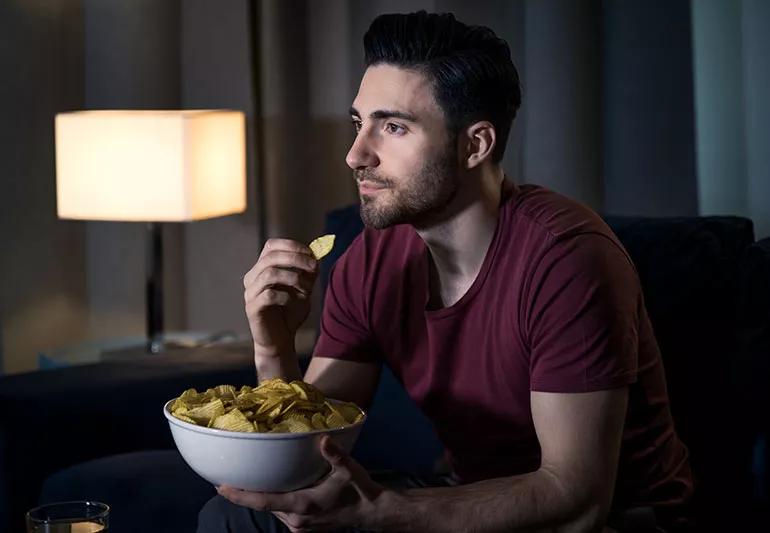These foods sabotage weight loss and rob you of rest

Image content: This image is available to view online.
View image online (https://assets.clevelandclinic.org/transform/c28f46be-cf43-4c44-a4f8-8cf6c46945ed/LateNightSnacking-1137307172-770x533-1_jpg)
Person eats potato chips while watching television in a dark room
You’re hungry. Dinner’s in the past and sleep is just ahead. What do you do?
Advertisement
Cleveland Clinic is a non-profit academic medical center. Advertising on our site helps support our mission. We do not endorse non-Cleveland Clinic products or services. Policy
Making the wrong late-night snack choices can add to your weight and subtract from your sleep, and no one wants all that serious trouble to come from a momentary lapse, or two, in hunger weakness.
“It works both ways. A healthy diet improves the quality and duration of your sleep. And adequate sleep improves the quality of your diet by curbing hunger hormones,” explains registered dietitian Julia Zumpano, RD, LD.
Here, our dietitians list go through the types of snacks to avoid when you’re looking at options late in the day.
“Having ‘something to do’ while you watch TV is not a good reason for eating,” says Zumpano. “You’re only addressing your boredom.”
“Ideally, to maintain your waistline, it’s best to eat all your meals before 6 p.m.,” she notes.
If you’re not truly hungry, “a late-night snack is a waste of fuel at the end of the day,” she says.
One of the worst offenders is cereal and milk. That’s because it’s hard to control how much you eat.
“Cereal is loaded with carbs, especially if sweetened — and let’s be honest, it typically is,” she says. Add 1 cup of any type of cow’s milk, and you get 8 grams of protein — plus 12 grams of carbohydrate. “Using whole milk also gives you extra fat calories that you certainly don’t need at the end of the day,” she notes.
Advertisement
If you must have cereal, look for a brand that’s very low in sugar and high in fiber, and measure out 1 cup, she suggests. Then pair it with an unsweetened milk alternative such as almond, soy, flax, hemp or coconut milk.
Limiting your night-time calorie intake is good for the waistline. But that’s hard to do with easy-to-binge-on salty snacks like potato chips and dip or tortilla chips and queso.
“These foods are not nutrient-dense. They’re calorie-dense — every little bite packs a ton of them,” notes Zumpano.
What’s worse, she finds that salty snacks don’t satisfy her cravings. “Instead, they trigger my sweet tooth, so that I end up eating another (sweeter) snack!”
“Late-night snacks should focus on foods that calm your body and prepare you for sleep,” says Zumpano.
“Steer clear of anything sugary or containing caffeine or alcohol,” she advises. It will stimulate your body. “Cookies, candy bars and anything high in refined sugar will reduce your serotonin levels, making it harder for you to fall asleep,” she notes.
Caffeine and alcohol disrupt sleep patterns, making it harder to fall asleep, stay asleep and enjoy the deeper stages of sleep.
Remember these tips the next time late-night cravings hit. You’ll appreciate making healthier choices when you hit the pillow — and the scale.
Advertisement

Sign up for our Health Essentials emails for expert guidance on nutrition, fitness, sleep, skin care and more.
Learn more about our editorial process.
Advertisement
Snacking can bring benefits with healthy food choices and planning
Stress, lack of sleep and not eating enough all contribute to sugar hankerings
Moderation is important for lowering risks
The color additive found in many pre-packaged foods may affect those with ADHD or allergies
What you eat between meals matters
A convenient and nutrient-rich snack
Practical tips for curbing cravings and smart swaps
These foods will nourish your body without ruining your diet
Type 2 diabetes isn’t inevitable with these dietary changes
Applying a hot or cold compress can help with pain
Pump up your iron intake with foods like tuna, tofu and turkey